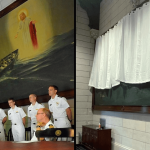Music at Mars Hill is a weekly column by Luke Larsen that seeks to find God amidst the newest trends in both mainstream music and independent music.
Cornerstone Festival has been the bedrock of the Contemporary Christian Music industry since its founding in 1984. Every summer, kids, families, churches, and hippies alike would gather to hear both the biggest and the most underground Christian bands rock for Jesus. And while there have been countless Christian music festivals held across the country, Cornerstone has long been one of the industry’s most important events of the year, successfully launching the careers of bands like Jars of Clay and Newsboys.
An article from Christianity Today puts it this way: “There’s nothing wrong with Christian music festivals. But when one closes, like Spirit West Coast did this year, others will fill the void. Fans of those events have plenty to choose from. But when Cornerstone closes up shop, nothing will fill its shoes.”
Although I’ve never attended Cornerstone personally, I had similar spiritual encounters with community, music, and the gospel at Creationfest Northwest growing up. I made friends, became closer to the friends and family I went with, and even had some memorable opportunities to respond to the presence of the living God there. Not having grown up in church, the flocks of concertgoers weren’t just proof to my adolescent self that Christians could be “cool” or could “rock.” It was my first time stepping into a community of that kind at all. To say it had a huge impact on my faith and the person I was becoming would be an understatement.
But this week, Cornerstone closed its doors for good and celebrated its final year. The festival is run by JPUSA (Jesus People U.S.A.), an evangelical denomination that got its roots from the Jesus movement of the late 1960s and the hippie counterculture surrounding events like Woodstock. This time period was the birth of youth ministry, Christian music, and Christian subculture—a defining moment in what it meant to be an American Christian living in the 20th century. Music festivals throughout the 70s and 80s marked a generation of young Christians who were as culturally savvy as they were profoundly set apart from the world—a group of Christians who weren’t afraid to proclaim the Gospel of Jesus through whatever means available.
But this is 2012 and there are number of reasons why Cornerstone is calling it quits. The most significant of course is that Christian music just doesn’t sell like it used to. According to a JPUSA member and festival organizer, the organization “would love to continue doing it, but [we are] just not seeing the ticket sales we need to pay for it each year.” If you need proof that the Christian music industry has been on a steady downfall in the past few years, all you have to do is turn on a Christian music television channel and count how many songs will get played that were from before the year 2005. (If you need more proof, check out Hillsong’s newest annual album—ironically titled Cornerstone—that maintains relatively the same musical style that is has used since 1992.)
But even by 2005, publications like RELEVANT and Paste began to point toward a way out for Christians who felt torn by being moved by art that the Church had deemed “secular.” This new generation of music-lovers inhabited the same spirit of cultural engagement and evangelicalism that was present in the original Jesus movement, but it was now set to play out in very different ways. Paste co-founder and editor-in-chief Josh Jackson said it this way: “I truly have nothing against artists who play contemporary Christian music or people who listen to it. But I am a little bugged by radio stations that take advantage of their audience’s fear by promising sanctuary from the evil world out there. Rather than engaging the world, it’s mostly just trying to sanitize its own little gated community inside it.” Paste’s motto embodies both a new mission and new perspective for Christians: The search for signs of life in pop culture.
The past fifty or so years of Christian subculture has given us a good place to start. We know who we are and where we have come from. But I believe we have been called into a new mission field as artists, critics, and music-lovers: the scary world of discernment and cultural engagement. My recommendation? Let’s mourn the end of an era and pay respects to the industry that has so significantly influenced our understanding of faith. The road ahead is unclear and undefined, but every day I find more and more hope in the future of the Church’s relationship with popular culture. This is only the beginning.















